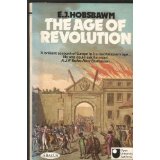 Be Jew Aware! |

Part of the standard view of European history promoted in particular since 1945. Hobsbawm was part of a rather inbred world, one of many Jewish immigrants into Britain before 1945, doing no doubt a routine PhD in Cambridge. He had tenure at Birkbeck College and of course became part of the post-1945 era when Britain had been impoverished by the war. His book was standard university fare; I have a copy which was bought in a University Union Bookshop in the 1960s. Several generations were routinely exposed to this material by their teachers. The cover design shown is an Open University set book.
I'll review this in the way it was written: as a Jewish view, unconcerned with truth, but to promote what Hobsbawm's groupthink mind presumably considered Jewish interests. These are Jewish power, and of course money. His emphasis on power is irritating to the truth-seeker: most of science and technology is treated dismissively, Hobsbawm's attitude being like a shareholder, taking little interest in difficulties or practicalities, which are left to the employees. Doctors, including 'some in Germany', appear in lists, but in the employee sense. There is a massive bibliography, in which he is very careful (without saying so) to point to books by fellow Jews, and Soviet reference books, but otherwise shows little discernment. Nevertheless the bibliography almost manages to look more interesting than the book. There are many maps of a hard-edged sort. There are endnotes on each chapter, mostly references, perhaps to remind him who he copied.
There's curious back-to-front reasoning (64): railways were important BECAUSE they were expensive. This was 'needed if the capital-goods industries were to be transformed' meaning presumably Jewish finance had an interest. His material on the French Revolution has no mention whatever that I recall of Rothschild financing of both sides, nor of the Rothschild financial coup in London just after Waterloo. In fact, the French Revolution is barely mentioned, (The American Revolution is all but unmentioned; its basis in trying to throw off the financial yoke based in Britain is not something Hobsbawm would wish to discuss).
On Malthus (335) Hobsbawm deems him 'neither as original nor as compelling as its supporters claimed'. Hobsbawm doesn't think in terms of crowding or overpopulation or deaths, but financially–Malthus proved 'the poor must always remain poor'. And Jews often provoked wars or famines: Malthus agonised over problems of food, but Hobsbawm cared nothing and wanted deaths, as the Talmud recommends.
Hobsbawm mentions (58) small men driven to be 'currency cranks' (the latter phrase is Jewish for anyone commenting on Jewish credit) and is the nearest he gets to a two-tier theory of money. It interested me to see Hobsbawm's pro-Freemasonry remarks when discussing Mozart. 'Ten million tons of coal' in 1800 puzzled me: what does Hobsbawm mean by this? Is it a lot? What are the implications? Naturally war deaths and injuries are pretty much ignored, and readers unaware of Jewish attitudes might regard this as objectivity. His nationalism chapter of course excludes 'Jewish' tribal racism.
The title is rather misleading: 'The Age of Revolution' and the dates 1789 and 1848 suggest the book is largely about revolutions, especially in those years. In fact there's little on either. The general feel and the contents suggest the book was never intended as a single, thought-through work: before the days of word-processors, the career writer would try to avoid the painful process or rewriting. Apologies for the tedium here: we find PART I: DEVELOPMENTS which are 1 THE WORLD IN THE 1780S/ 2 THE INDUSTRIAL REVOLUTION/ 3 THE FRENCH REVOLUTION/ 4 WAR/ 5 PEACE/ 6 REVOLUTIONS/ 7 NATIONALISM an achronic list. Then PART II: RESULTS which are 8 LAND/ 9 TOWARDS AN INDUSTRIAL WORLD/ 10 THE CAREER OPEN TO TALENT/ 11 THE LABOURING POOR/ 12 IDEOLOGY: RELIGION/ 13 IDEOLOGY: SECULAR/ 14 THE ARTS/ 15 SCIENCE/ 16 CONCLUSION: TOWARDS 1848. The shoehorned descriptive non-analysis is discouraging.
Hobsbawm admires Marx, and is entirely subservient to Marxian Jews; the endnotes praise Marx's 'Capital' as 'almost contemporary'. Hobsbawm liked Hegel, who brought the advantage of allowing serious-sounding Germanic generalisations which look profound, though modified to be Jewish. This textbook must be viewed as a product designed to be put before students, rather than a serious work of history. Hobsbawm has a frown-inducing attitude of depending on (76-7) retrospective importance, in that case his estimate of the French revolution; rather like saying (e.g.) Marx was enormously important, so let's investigate his parents and grandparents. The more-or-less Marxist vocabulary is inescapable: 'bourgeois', 'implacable cash nexus', 'mature industrial economy', 'proletariat'.
Non-Jewish material clearly glazes over Hobsbawm's eyes. Subjects get their routinised dutiful sentences: Carlyle? Hapsburgs? Lancashire? 'Industrial revolution'? Music? Science? But there's a flicker of excitement where Jews are challenged: (343) Thierry brothers' idea that the French descended from the Gauls, and the aristocrats from Teutons, and Gobineau. As might be expected, ancient controversies depending partly on sheer lack of information aren't treated fairly: Sir William Lawrence's Natural History of Man 1819 (340) was part of the dispute as to whether natural growing things might be man-made. It's always interesting to see how sympathetic writers are to (e.g.) alchemy, or the very remote prehistory of mankind, or economics before much information existed.
Here's a Youtube of Hobsbawm on the Jewish coup d-état in Russia. Oh, sorry. The 'Socialist Revolution'. And its history. I taped this about 16 years before his death:-
Can We Write the History of the Russian Revolution?
Rae West. This version has a new sentence on Malthus. 11 Feb 2023.